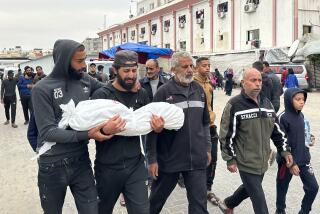U.N. Keeps Sanctions on Recalcitrant Iraq
- Share via
UNITED NATIONS — Faced with a fresh reminder of Iraqi intransigence, the Security Council on Thursday unanimously rejected any easing of economic sanctions against Baghdad but remained divided on any further action.
The council decision followed a gruff dismissal by Iraqi Deputy Prime Minister Tarik Aziz of an overture from chief U.N. weapons inspector Richard Butler. Butler had written to Aziz on Wednesday suggesting a resumption of the arms inspections suspended earlier this month after Iraq ended cooperation with investigators.
Aziz replied with a statement released by the official Iraqi news agency Thursday denouncing Butler and calling Iraq’s decision “permanent.”
Meanwhile, some U.N. disarmament officials expressed fears that the subdued response by American and U.N. officials in the latest confrontation with Baghdad may embolden Iraqi President Saddam Hussein to eject those U.N. weapons inspectors still in the country, clearing the way for full resumption of illegal weapons research and production.
Citing repeated threats by Aziz and other top Iraqi officials, these sources suggest that it may be only a matter of time before Iraq expels the 100 or so disarmament workers remaining in Baghdad and dismantles the video cameras and other devices monitoring activities at sites that could be used for weapons development.
Nizar Hamdoun, Iraq’s ambassador to the U.N., said Thursday that such speculation is “premature” but pointedly added: “I don’t think one should rule out anything. If the situation continues and the sanctions are not lifted, there would be many levels of response.”
In an Aug. 5 letter to the U.N., Aziz said Iraq was “totally suspending its cooperation” with the weapons inspectors but as an interim measure would permit continued use of video monitoring and other passive forms of inspection. In practice, the Iraqi decision has prevented the inspectors from examining sites not previously visited.
The Security Council has called Iraq’s action “totally unacceptable” and called for a reversal. But the 15-member body has declined to specify any consequences for Baghdad.
The pattern continued Thursday as the council conducted its regular 60-day review of the sanctions against Iraq. As expected, the council proposed no changes in the sanctions, which prohibit Iraq from controlling revenues of its oil sales and cannot be lifted until the weapons inspectors certify that Iraq has rid itself of its nuclear, biological and chemical warfare capacity and long-range missiles.
“Once again, the Security Council has decided to continue sanctions indefinitely,” U.S. Ambassador Bill Richardson said. “. . . There is no prospect for lifting sanctions until [the Iraqis] comply [with inspectors].”
Richardson and others in the closed-door meeting said no nation supported an easing of sanctions.
There was no agreement, however, on what else should be done, except to meet next week with Prakash Shah, who is Secretary-General Kofi Annan’s special representative to Iraq.
Shen Guofang, a Chinese representative at the U.N., also called for Iraqi officials to travel to New York for a “comprehensive review” of the inspections program with the council.
Richardson called on Annan to personally intervene. “The next step is the secretary-general,” he said. “We want to see his active diplomacy and skills used.”
But Fred Eckhard, Annan’s spokesman, said the secretary-general, who is on vacation, has no immediate plans to get further involved. Eckhard said Annan expects Butler and the Security Council to take the lead.
Eckhard also disputed reports Tuesday in the Los Angeles Times and the Washington Post, attributed to U.N. sources, that Annan believed that the Clinton administration’s muted response in the current conflict stems in part from political considerations. Top aides to Annan were said to be concerned that the reports might damage relations between the secretary-general and the administration.
“He has at no stage and in no forum expressed the views ascribed to him,” the statement said.
More to Read
Sign up for Essential California
The most important California stories and recommendations in your inbox every morning.
You may occasionally receive promotional content from the Los Angeles Times.













